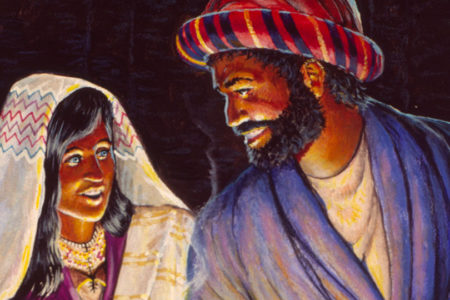Rome Revisited
The days of the judges were a time of almost unbroken national depression for Israel. All of the indicators for survival and success of the nation were pointing downward. The mood swing from the time of Israel’s exhilarating entrance into the Promised Land under Joshua and Israel’s irrepressible warriors to the dismal, failure-filled chronicles of his successors was one of the most dramatic in the nation’s roller coaster ride through history. There were few heart-of-steel Calebs who could say, “I wholly followed the Lᴏʀᴅ my God” (Josh. 14:8). Few were there, indeed, who could raise his valiant request, “give me this mountain” (Josh. 14:12). No, the nation had lost its way, and it seemed that survival for Israel was an open question.
The order of events contributing to their calamity was disobedience, compromise, and idolatry—a slide into darkness that opened the door to immorally and virtual anarchy. Verse 6 of Judges 10 gives us a fair summation of Israel’s national and spiritual situation:
And the children of Israel did evil again in the sight of the Lᴏʀᴅ, and served Baalim, and Ashtaroth, and the gods of Syria, and the gods of Sidon, and the gods of Moab, and the gods of the children of Ammon, and the gods of the Philistines, and forsook the Lᴏʀᴅ, and served not him.
Israel disobeyed God by failing to carry out His clear command to expel His enemies and theirs from the land: “And the children of Benjamin did not drive out the Jebusites, who inhabited Jerusalem” (Jud. 1:21). The same would be said of Manasseh, Ephraim, Zebulun, Asher, and Naphtali.
Clearly, as is always true with those who fail to obey, compromise with the ungodly seemed in order. “And it came to pass, when Israel was strong, that they put the Canaanites to forced labor, and did not utterly drive them out” (Jud. 1:28). The results were predictable. Israel’s conduct evoked severe rebuke from God. When they “did evil in the sight of the Lᴏʀᴅ” (e.g., Jud. 2:11), He turned them over to their enemies for correction and rebuke until they were prompted to cry “unto the Lᴏʀᴅ” (e.g., Jud. 3:9) for deliverance.
And so it was written, much like an epitaph, “In those days there was no king in Israel; every man did that which was right in his own eyes” (Jud. 21:25). In other words, men were consigned to finding their own way in a spiritually hostile environment. In the eyes of some, this represented liberation; in actuality, it amounted to their receiving what they deserved rather than what they desperately needed from the God of all grace and mercy.
Humanly speaking, as has so often appeared to be true of the Chosen People, the situation looked hopeless. But it was not! In reality, Israel’s future would not be dictated by her present dismal circumstances. In the midst of all the national, moral, and spiritual carnage that, in the eyes of some, had prevailed, there rested resources that would carry the nation through her current dilemma. When the present had faded into picturesque stories of bygone days, the true substance of the issues being determined would endure to potentially benefit the whole of humanity; for in the midst of all the ruin there was a remedy, a remnant, and, above all else, a Redeemer.
Although this pattern for preserving the nation surfaces in the Book of Judges periodically through the likes of Gideon and Israel’s parade of deliverers, it is most clearly portrayed in the Book of Ruth, for here we discover an island of spiritual serenity in a sea of national chaos.
The setting is Bethlehem, city of David, birthplace of the coming Messiah. The terraced fields on the approaches to the place where Ruth gleaned speak of serenity. Even today, with all of the tension found in Bethlehem and the surrounding area, the gentle green patches of earth harboring small vineyards and olive trees within the stone enclosures in the fields once belonging to Boaz give the feeling that all is well. And, as the story unfolds, this well-being is confirmed for us: All is well, because in that place—with a simplicity that only God Himself could fashion—grace, love, redemption, peace, and security take the stage to play out before us the fact that at every juncture in history—no matter how confused things seem to be—God has His plan, God has His remnant of faithful people, and God, through those people, continues to extend His grace and mercy through redemption.
As you read the articles that follow, you will discover the timeless message of God’s sovereign working in the darkest of days in history. It is a reminder that is sorely needed in America today.
In many respects, events taking place in America parallel the condition of ancient Israel during the period of the judges. Moral and spiritual standards have deteriorated at an alarming rate over the past few decades. The rate of decline accelerated until, in November of 1992, the nation chose to pursue a new direction—a course that will, apparently, no longer follow our traditional Judeo-Christian way of life.
We readily admit that this nation is not, as was Israel, a theocracy (a country over which God Himself is sovereign). Israel’s experience was unique and has not been duplicated in any other national arrangement. Having said that, we must acknowledge that no other nation in history has more solidly built a national structure on Judeo-Christian standards and values than has the United States of America. And, in many commendable respects, we could lay claim to the blessing of a “nation whose God is the Lᴏʀᴅ” (Ps. 33:12).
Being reared in America a generation ago meant experiencing life in which the lines for conduct, ethics, and morals were clearly drawn. One did not have to be a Christian to understand right and wrong, what was acceptable and what was not. Our laws were based on Judeo-Christian factors and were enforced accordingly; and, in order to lead “a quiet and peaceable life” (1 Tim. 2:2), one lived within the limits of the law.
The Every Man Right in His Own Eyes Scenario
America’s break with the past came with the change in attitudes about moral absolutes and the determination to make man, rather than God, the center of the universe. Ultimately, God was virtually banned from America’s public institutions, and the U.S. stood shoulder to shoulder with Communist systems in the determination to develop a society unencumbered by recognition of God. Particularly devastating has been the banishment of God from the classrooms of our public schools. Social revolutionaries rightly recognized that control of the classroom means control of the future of the nation.
Establishment defiance of God was coupled with an onslaught of debasing influences from purveyors of immorally. The entertainment industry and media radicals, among other entrepreneurs of evil influence, began pummeling the public by flaunting the First Amendment in pursuing their “right” to debauch the nation in the interest of personal enrichment.
A Time For Change
In November of 1992, against this background of moral slippage, the nation made a choice—a choice for change. Political campaigns were crafted on the promise of radical change. Explanations of where these changes would take us were not clear, but the promise was there—we will have change. One must remember that the impetus for change did not originate with the political candidates—Democrats or Republicans. They responded to demands welling up in the public sector of American life. Baby boomers were moving forward to take the reigns.
In the end, America opted for economic expediency—never mind what was riding on the coattails. The fact that dollar-hungry secularists were joined by thousands of evangelical Christians places a marker on just where America is at this juncture because, as perhaps at no time in recent history, the issues were definitively drawn. America had a clear choice: slow economic growth and hold to Judeo-Christian values and restraints or go for an immediate economic transfusion and social change. How radical that social change will be is anybody’s guess, but early harbingers may frame the future. Syndicated columnist Cal Thomas expressed what those who looked beyond political promises and media hype were thinking: “The torch may have indeed been passed to a new generation, but the light has gone out on the social and moral issues that are the heart of our nation.” Former Housing Secretary Jack Kemp adds an ominous observation: “Democracy without morally is impossible.”
The Wake-Up Call
- Americans, at least at the national level, can no longer define what a family unit is. And all the scare-tactic nonsense about single-parent homes not being viewed as a family by compassionless, “right-wing” Christians, etc. was only a cover for confusion deliberately created to implement the ultimate recognition of perverted partner relationships under the law. Such a condition manifests just how muddled the nation’s understanding of family and family values is.
- The battle over abortion rights has been settled. America will have abortion on demand as a legally enshrined matter of personal convenience. And if, as many suspect will happen, the abortion pill is brought into the U.S., abortion clinics will no longer be needed; the unborn will die—case closed.
- Homosexuality has been brought out of the national closet. Gays believe they now have advocacy at the highest levels of government and will become an officially protected and promoted minority.
And, if these facts-of-life changes are just the beginning, one can only speculate where we are headed.
Rome Revisited
The late Francis Schaeffer articulated it years ago. “We are now,” he warned, “Living in a post-Christian era.” He was correct, and his statement, starting as it was, made great table conversation. Functionally, however, few evangelicals paid much attention. Immersed as most Christians were in our affluent and secular lifesyle, Schaeffer’s fears embodied the kind of remoteness reserved for philosophers’ musings.
But now we’ve had the much-touted “wake-up call.” Rome has returned, and contemporary Christians are being faced with the challenges encountered by our first-century forefathers. We are exactly where the Scriptures declared we would be in the last days. You can confirm this by reading Romans 1. And, rather than being depressed about what’s going on around us, we should be encouraged about what has opened up to us.
- We must know by now that we are not living in a religion-political utopia. America will not be molded into a theocratic nation.
- As in the bleak days of the judges, there is an awakened remnant who stands, as in that ancient day, like an island of serenity in a spiritual and moral sea of chaos and confusion. As Ruth sparkled against the darkness of her day, so believers stand at this hour as “a light that shineth in a dark place” (2 Pet. 1:19).
- Finally, it should now be confirmed—really confirmed—that we have, in all its aspects, only one remedy to offer and, incidentally, the only true remedy available: the gospel. Paul took it to pagan Rome, and it penetrated the darkness and transformed sin-be-knighted people who had given up all hope. For people out of options, sinking into the swill hole of paganism, the gospel will triumph once again.
Our mandate at this moment is to proclaim and live out a clear contradiction to all of the spiritual and moral corruption that is plaguing the nation. Thank God, there is a Redeemer.
Let’s pursue, with every fiber of our beings, Paul’s pattern for pagan Rome:
So, as much as in me is, I am ready to preach the gospel to you that are at Rome also. For I am not ashamed of the gospel of Christ; for it is the power of God unto salvation to everyone that believeth; to the Jew first, and also to the Greek (Rom. 1:15–16).







